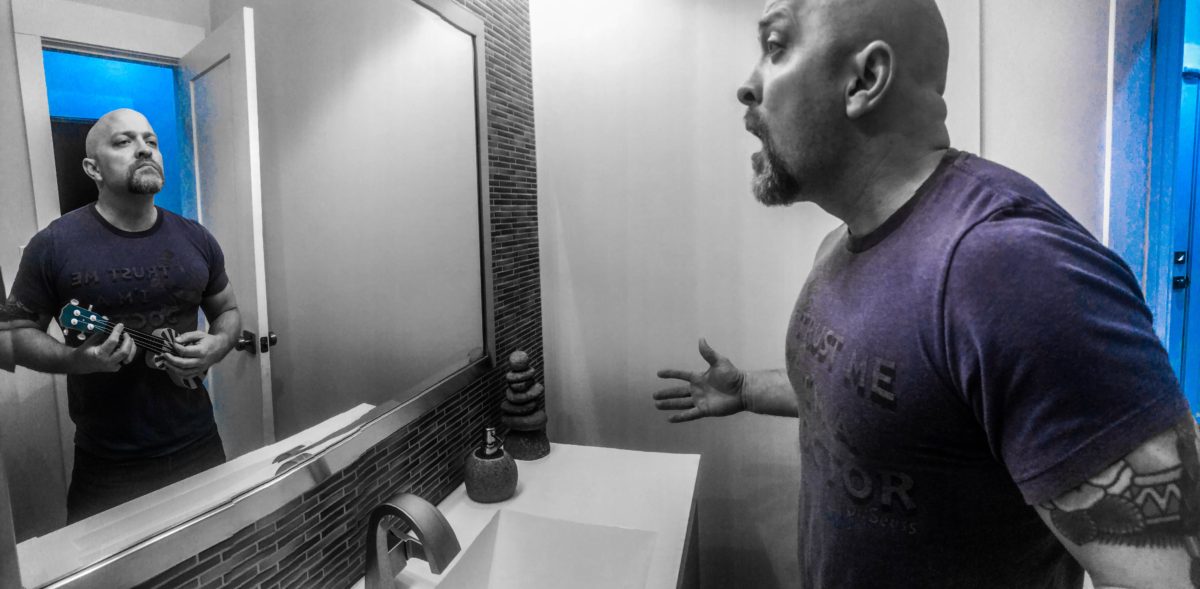Sometimes…
I go behind the looking glass and down the rabbit’s hole.
I can’t help it. It’s just the way I am.
Which is exactly what I want to talk about.
I gave up Netflix, HBO, and Hulu for Lent. Which leaves me with a lot of time on my hands to sit and think.
Well, okay, actually…I’ve just spent more time on Youtube. (I know that’s not the point of Lent. I get it.)
Recently with my Youtube wormholes I’ve found myself studying two distinct things.
- Psychoanalysis
- Determinism
Determinism is the idea that there is no free will. Your actions are determined by your biology. Your genes. Your physiology. Your chemistry. Your electron exchanges. Etc.
Just like you didn’t pick your parents, where you were born, or what spoon you were fed with…
You also don’t get to choose your decisions.
The strict determinist will say that your biology determines how you respond to painful stimuli, stress, bad news, and loss. (As well as the good stuff, too.) Therefore, it is the reason you do anything that you do.
Raise your right hand? Determinism, not free will.
Open the door for an elderly person? Determinism, not free will.
Kill fifty people with an assault rifle? Determinism, not free will.
But that’s crazy, right?
Well the answer, like most things in life…is complicated.
And you kind of see how the theory breaks down. It takes away self responsibility. There is no blame and, also, no good deeds. There is only what it is. No good or bad. No right or wrong.
If you know me, you know I don’t go for this type of thinking. Morality is real. You can see this by examining its opposite. Reading DHS case reports, treating methamphetamine addiction, or working divorce court. Some would say, these just prove the point. And I get that. It’s just a much more nuanced conversation than we can have here.
But for the purposes of this article, let’s just say I have a very empathetic ear for the medical knowledge that determinism allows us to pursue.
Because we can start to look at the root causes of addiction, depression, mania, and psychosis. We no longer have to blame the patient or ask them to use more “will power”. Instead, we can treat the disease.
And now, here is the interesting thing (and you can let me know if you think it’s a contradiction or not)…
People change.
In fact, my whole career is based off the idea that people can change.
So, what made you doesn’t have to make you after all. In fact, your un-making might be what makes You. And who decides that?
The idea of a YOU is in your head. It’s a label you give yourself to accept the harshness of reality. Or to say it another way, it’s a story you tell.
Most of the stories we tell are false narratives based on other’s perceptions and narratives. We are stuck in the ideology of our present state. But maybe stuck is the wrong word. Because like I said before, people will surprise you.
Want to change? Write a new story. It’s that simple.
Now, you might be limited in your ability to change, because there’s still that tricky biology to overcome.
That’s okay.
The truth is, psychiatric illness has long been the red-headed step child of medicine. (Apologies to my mom).
Neglected and misunderstood. Easier just to ignore it than face it. Because, like Nietzsche said, “When you stare into the abyss, the abyss stares back”.
We don’t want to face the problem of mental illness because it feels so foreign, so mystical, so terrible and yet…so close.
In the past, we had no answers. Was it bad parenting? Attachment issues? Oedipal complex? Demons?
But now, we can identify the genes and the neurochemistry responsible. We understand better the mechanisms, and, in turn, we look for treatments to pinpoint the biology.
The biology is the answer.
But there’s a problem.
Because biology is the answer, but it’s not the full answer. A person is more than their biology. A person is an idea inside a mind, and, of course, that mind swirls with cells and chemicals and the rest. But doesn’t there seem to be something a bit more?
And that’s where psychoanalysis comes in. A way to get inside that beautiful brain of yours without the scalpel.
I’m not saying you have to lay on a couch and tell a therapist all of your dreams and perversions. (But maybe you should do that as well. And in the good old days, people would just go talk to their Priest.)
Talk therapy can have amazing benefits for patients struggling with despair, psychosis, neurosis, and all types of daddy issues. (Okay that was a joke, lighten up.)
Because the Psychoanalyst will tell you…
Well actually, she won’t tell you anything. She’ll just listen. Patient and kind, slightly guiding. Until you start to unravel your own mystery of what made the you, you. And what will make the You now.
But it’s complicated.
And it takes time.
And such is life.
P.S.
I see you.

p.p.s.
Have you read some of the reviews to my book?
This book is the best! Not as good as mine, but still REALLY REALLY good.
–Donald Trunk
I’ve never been more excited for someone to cut down a tree, just to turn it into the pages that became this book.
–Big Foot
This book gave me the guts to keep playing football when everyone else said to quit.
–Tom Brody
Be First to Comment